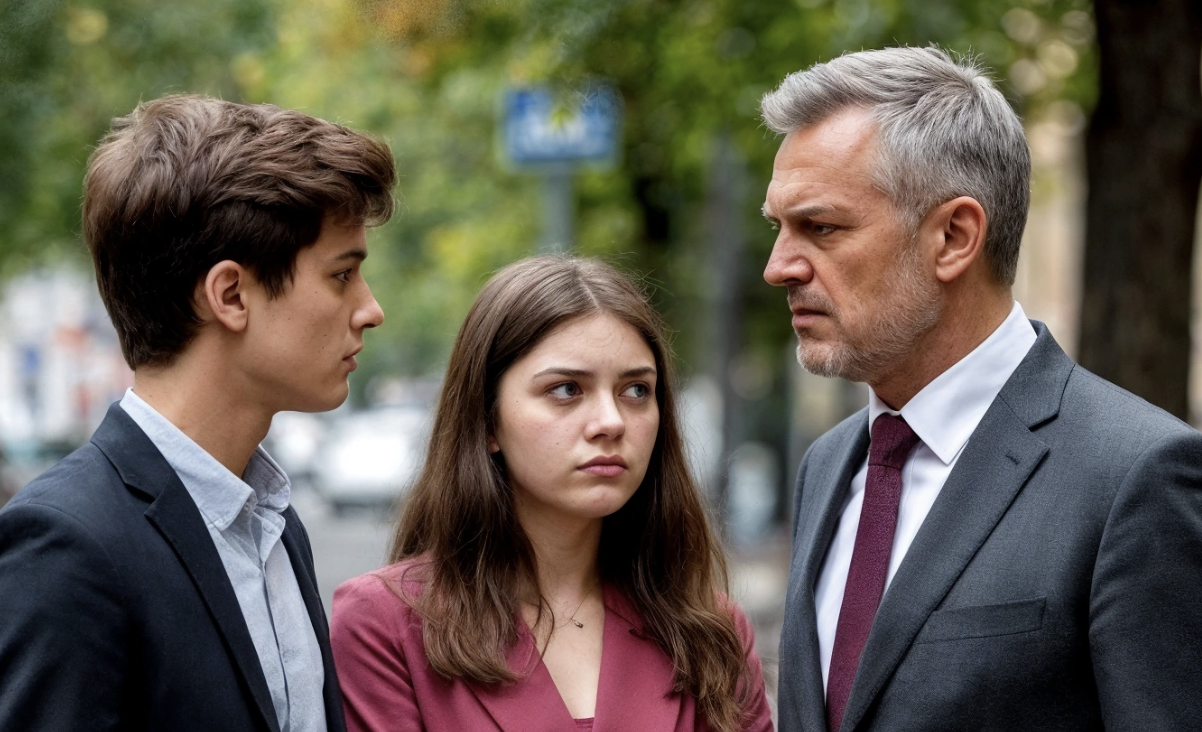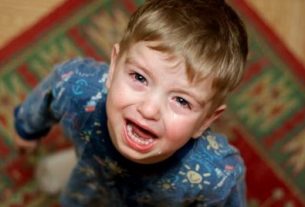Oleg sat at the very last desk in the stuffy classroom, wilting from the heat and the monotonous droning of the lecturer. May was in full swing — just like the last semester, the last lectures, the last hours before the long-awaited freedom. The lazily buzzing fan barely moved the warm air, which felt more like a forewarning of the coming June than relief from the heat.
Outside the window, the trees were green, and in Oleg’s mind, one thought kept spinning:
“I’ll finish my thesis — and immediately be free. Dive into IT — that’s when real life begins.”
Next to him sat Kirill, his best friend, wearing the expression of a man doomed to a slow death from boredom. He was sketching the face of some monster in his notebook and from time to time threw Oleg a look filled with a silent question: “When will this end?”
Suddenly, the door creaked open, and the dean’s assistant entered the room. The students stirred. The girl in a white shirt, with her ever-present notebook in hand, swept her gaze over the class as usual:
“Guys, we have a small request. The shelter near Chashcha is asking for help again. The university has packed food supplies that need to be delivered. Anyone with a car?”
Oleg glanced at Kirill. Kirill, as if expecting this, immediately perked up:
“We’ll go.”
“We?”
“Of course! We’ll get some fresh air. And escape this stifling heat.”
Oleg smirked and raised his hand:
“The two of us. We have a car.”
The assistant thanked them, handed over a list and an address. While the others returned to their laptops, the friends slipped outside, catching cool air with their mouths.
“Thanks, brother,” Kirill exhaled. “I thought I was going to suffocate from boredom.”
“Yeah, now only a free ride for charity. Hope it’s not worse than I imagine.”
“A shelter is a shelter. Not a five-star hotel.”
They climbed into an old Kia that Kirill had bought with his scholarship, side jobs, and a little help from his parents. The trip began almost like a getaway: the road wound between forests, pines mixed with birches, occasional houses appeared, and the air smelled like childhood summer at the countryside.
But everything changed when they turned onto a narrow road and saw rusty gates with the sign: “Children’s Home No. 14.”
Behind them opened a bleak scene: two crooked buildings, peeling walls, a half-collapsed fence, and cardboard poking out where windows should be. The air was thick, with a bitter damp smell.
They were met by a silent guard, about fifty years old, in a worn uniform with a cigarette in his teeth. Without a word, he nodded toward the administrative building — apparently, that’s where they needed to go.
“Feels like a scene from a Gulag movie,” Kirill whispered.
“Don’t joke,” Oleg replied. “Children live here. Look at the windows…”
Inside was even worse. Gray walls, mold spots, creaky floors. Dirty carpets that hadn’t been cleaned for ages lay in corners. In one corner stood an old cabinet with empty shelves. The only light was a dim bulb. From the next room came thin, stifled crying of a child.
Oleg felt something tighten inside. He wasn’t sentimental, but what he saw awakened a heavy feeling. Kirill also darkened.
“This shouldn’t be like this,” Oleg said, “Not just poverty. This is… neglect.”
They handed over the food boxes and were about to leave when suddenly a little boy in torn sandals and a worn-out T-shirt ran around the corner. He bumped right into Oleg and, clutching his shirt, looked up at him with big brown eyes:
“You’re my dad. I’m Dima Karnaukhov. I’m four years and three months old.”
Oleg’s heart stopped. He knelt down, not knowing what to say. Kirill silently stood behind him.
“No, little one… I’m not your dad. But I’m a good guy. I brought you food and toys.”
“Can I show you my box?” whispered Dima. “It has my secrets.”
Oleg nodded. The boy led him to his room — a tiny space with a cardboard box in the corner. Inside were three broken toy soldiers, a toy car without wheels, and a dried pine cone.
“This is Mafyna, this is the Captain, and this is a pine rocket. I’ll fly home on it when I grow up.”
Oleg clenched his jaw. He sat down quietly and said:
“You’re very brave, Dima. And kind.”
“Will you come again?” the boy asked, looking into his eyes.
“I promise. I’ll definitely come.”
They returned to the corridor. Kirill waited motionless. At that moment, a woman in her fifties, wearing a colorful robe, sweaty cheeks, and a sickly sweet smile, came out of the director’s office.
“Well, kids, thanks for the help! Everything delivered, everything documented?”
“Yes,” Oleg replied. “But can I ask — where are the supplies kept?”
“There is a storeroom,” she nodded, “but it’s closed today. I’m keeping it temporarily.”
Oleg peeked inside. There stood the very boxes: buckwheat, cookies, butter, condensed milk — everything the university had sent for the children. Nearby — half-drunk coffee, pastries, and Marlboro cigarettes.
Oleg understood — something was wrong here.
“So, for the children?”
“Of course! I’ll distribute it tomorrow!”
He left without a word but clenched his fists so hard his fingers turned white.
“Did you see that?” he hissed, addressing Kirill. “She’s hiding the aid for herself. Just stealing.”
“What a face.”
“I won’t let this go,” Oleg said firmly, pulling out his phone.
That night, at home, Oleg couldn’t sleep. Dima’s eyes, his box of “treasures,” the smell of rancid butter and condensed milk from that same table lingered before him. He tossed and turned until he sat down at his laptop.
“What are you doing?” Kirill peeked from the kitchen with a cup of tea.
“I’m going to write. A call. Let’s call it a ‘cry from the soul.’”
“What call?”
“We’re IT guys. We can’t do it ourselves — so we’ll organize help through the network.”
Oleg opened a social media group, uploaded photos from his phone: cracks in the walls, holes instead of windows, Spartan beds, broken toys. And at the end — a photo of Dima smiling at his soldier.
The caption was simple:
“Today we visited the children’s home. Kids live here. They are fed what remains after greed. They have no toys, little food, no chances. But they have faith that adults can be kind. If you can — come. Not money, not cards — personally.
Address: Shelter No. 14 near Chashcha.
We will be back on Saturday.”
He pressed “publish,” then paid for reposts in local groups. Some helped for free — because they felt it.
Kirill, looking over his friend’s shoulder, snorted:
“Well, you’re a hero. Keep it up.”
“I’m not a hero. I just couldn’t stay silent. What I saw tore me up inside.”
The next day, the post already had over fifty comments. By evening, there were two hundred. On the third day, people started responding — including former shelter residents. One, now the owner of a car wash in a neighboring city, wrote:
“We’ll bring three guys and help with the electrical work. Thanks for raising the issue.”
An elderly shop teacher called:
“Boy, I’m old, but my hands still remember the work. I can gather a group of helpers.”
Oleg didn’t expect such a response. His simple and honest words triggered a chain reaction. Messages came from other cities offering construction materials, clothing, even professional chef services. He felt something was starting to change.
On Saturday, three cars arrived at shelter No. 14. Young guys with paint cans and tools got out of the first. Men around forty loaded drywall sheets from the second. From the third — a girl in a green windbreaker, her ponytail tightly pulled back and a look that even made the air denser.
She stopped by the gates and loudly declared:
“Open up! I know you’ve hidden everything again for yourselves! I don’t care who covers for you. This was my father’s shelter. And I will change everything.”
Lyudmila Stepanovna — the director — rushed out of the building. Her smile was as fake as everything around — like she stepped out of an old horror story.
“How dare you? Who are you anyway?”
“I’m Svetlana Anatolyevna. Daughter of the shelter’s founder.”
Oleg, standing nearby, slowly stepped forward:
“She’s right. We were here a week ago. All the boxes of food were in her office, next to coffee and cigarettes.”
“You… you’re lying!” the woman screamed, but no one cared anymore.
Someone took out a phone and started recording video.
Svetlana turned to Oleg:
“Thank you. Are you from the university?”
“Yes, my name is Oleg. My friend and I brought help but couldn’t just leave.”
“I’m glad you didn’t.”
Her face didn’t fit beauty standards from magazines: a big nose, thin lips, somewhat masculine features. But in her eyes shone something more — warmth, determination, and inner strength as if she’d been through her trial and emerged stronger.
She didn’t wear designer clothes or smell of expensive perfume. Just a windbreaker, sneakers, and purpose in every movement. Oleg looked at her with newfound respect.
“I came back from London,” she said. “My father — Anatoly Viktorovich — was the one who founded this shelter. Now I see what it’s become. If necessary — I’ll live here until everything is fixed.”
Oleg nodded. Kirill thoughtfully scratched his head:
“What if we really help? Not just come now and then, but organize everything seriously — a plan, a schedule, work?”
That’s how the real volunteer campaign began.
One of Oleg’s childhood heroes said: “If you start something — finish it.” And here was the moment when that stopped being just a phrase.
He ran up to the kids and loudly announced:
“Guys! Who wants the most important and responsible job?”
“Me! Me!” they shouted in chorus.
“Then listen carefully: only the most reliable can paint the fence. It’s not just painting — it’s a mission. Only those ready to work seriously.”
The boys rushed to the paint bucket. Fifteen minutes later, the fence burned in all shades of blue and green. One board accidentally turned purple.
“I want to make a rainbow!” shouted a girl with braids.
Dima joined in too. He took a brush, dipped it in paint, but slipped and with a crash fell right into the bucket.
“I’m the paint!” he declared, all smeared, happy, and content.
Laughter rolled through the yard. Even Kirill couldn’t hold back and laughed.
“Tom Sawyer’s resting,” he said. “Looks like you’re a teacher from God.”
A few days later, Oleg rode the bus at the university. A couple sat nearby — a woman in a modest dress and a man with a kind but tired face. They were silent for a long time, then the woman whispered:
“Maybe we should try again? I feel like he’s waiting for us somewhere…”
“Tanya, how long? We’ve been trying for seven years. How much money have we spent on IVF?”
“But what if… we just looked in the wrong place?”
Oleg froze. Something clicked inside: “That’s them. That’s the chance.”
He turned:
“Sorry to overhear. But there’s a boy. He’s four years old. His name is Dima. He lives in a shelter and asks every day: ‘Where is my dad?’ Maybe you should visit. See for yourself.”
The man pressed his lips. The woman put her palm on her heart.
“Where is it?”
“Shelter No. 14 near Chashcha. I’ll write down the address now.”
Oleg quickly scribbled the details and handed it to them.
“Thank you,” the woman whispered. “We’ll definitely come.”
The bus stopped, Oleg got off. Inside was a strange feeling — as if he really did something meaningful. Not for glory, not for applause, but because he couldn’t do otherwise.
A month passed. The air in the shelter changed — instead of dampness and mold, it smelled of fresh paint and homely comfort. The bedroom walls were painted in light tones, children’s drawings appeared in the hallways. Each one had suns, flowers, little people with captions: “mom,” “dad,” “dream.”
The dining room, once a soulless institutional space, now filled with the aroma of stewed meat and homemade pies. The children ate silently, as if not believing the food was real and no one would take it away.
Lyudmila Stepanovna noticeably wilted. She almost never left her office, only appearing occasionally at meetings to say “everything is under control.” But now her voice sounded uncertain, like a person who lost her footing.
Meanwhile, Svetlana became the center of everything. She carried a notebook, checked purchases, helped with repairs, gave advice. She wasn’t elected director, but everyone listened. She didn’t boss people around, but her authority was indisputable.
One day Oleg approached her:
“Still haven’t decided — tell your father or not?”
“I don’t know,” she admitted honestly. “He thinks I came back because of memories. If he finds out I found Lyudmila and started changing everything… I’m afraid he’ll explode.”
“Maybe he should know?”
“Maybe. But not from me.”
She left, leaving behind a shadow of thoughtfulness.
Meanwhile, far away in London, in a luxurious 15th-floor office, Anatoly Viktorovich was reviewing a security report.
“Ordinary guy, provincial,” the assistant reported. “IT student, lives in a dorm. No connections, no money.”
“So why is he close to Sveta?”
“They’re often together. He’s actively involved in the shelter’s restoration. Reviews say he’s proactive. And seems not stupid.”
“Oh?” the father smirked coldly. “When you have nothing and you’re clawing at a billionaire’s daughter?”
“Maybe he has serious intentions,” the assistant carefully added.
Anatoly Viktorovich closed the folder and stood up:
“Then I’ll come myself. I want to see this… hero. I’ll give him a test.”
That same day Oleg was returning from the store. In his hands were bags of groceries, in his mind thoughts of Svetlana. He remembered recently seeing Marina — the one who called him “weird” because he helps children.
“Hi, where have you been?” she asked, smelling of expensive perfume.
“At the shelter.”
“Ugh, how awful. You’re still so incomprehensible.”
He didn’t answer then. But now he understood: in Svetlana was everything Marina lacked. Real warmth. Simplicity. Honesty. With her, he didn’t have to pretend, play roles, or prove anything. With her, he was himself.
At the entrance, he stopped and typed a message:
“Sveta, can we talk?”
“Of course, Oleg. What happened?”
He took a deep breath:
“I… don’t know how to say this. Maybe it’s strange. And yes, I’m not good at this. I just… love you. Not like in the movies, but for real. Probably since the day I saw you helping Dima.”
A pause. One second. Two.
“I love you too. Since the moment you took his hand.”
Oleg smiled. He felt everything was right.
Two days later, they stood in line at the registry office. Without noise, without flashy luxury. They just filed the paperwork. Instead of rings — two paper numbers.
“Are you sure?” Oleg asked while signing.
“Yes. Even if the whole world is against us, I chose long before we got here.”
Oleg looked at her — in jeans, with messy hair, no makeup. But her eyes held more than her father’s safes. He knew: with this woman, he was ready to go through anything. Any trials. Any mistakes.
When they left the registry office, holding hands, Kirill filmed them. Friends shouted “bitter!” (a wedding toast), someone took photos, someone just smiled.
“Well,” Oleg smiled, “shall we celebrate at a restaurant?”
“No way,” Sveta firmly replied. “We’re going to McDonald’s. Their pies are the best in town.”
They were about to cross the street when suddenly a whole convoy of black SUVs screeched to a halt. A driver in a sharp suit opened the rear door. Anatoly Viktorovich stepped onto the sidewalk — in a long coat, with a stern expression and no hint of joy.
“If my daughter decided,” he said loudly, looking around, “I won’t interfere. Congratulations to the newlyweds.”
He extended his hand to Oleg.
“Welcome to the family. Just don’t let me down. Otherwise, you won’t even realize how you turned to dust.”
Oleg, a bit confused, still shook his hand. Svetlana frowned but didn’t flinch. Kirill standing nearby snorted:
“Was that a serious warning or a movie quote?”
“That was life, brother,” Oleg quietly replied, hiding a smile.
A week passed. The morning was quiet and clear. Outside the shelter, children drew on the asphalt, and Oleg and Svetlana stood at the entrance, hugging. At that moment, a car with eye-catching license plates stopped at the gate.
Anatoly Viktorovich stepped out of the Maybach. He was impeccably dressed, his gaze harsh but his face showed slight softening. Next to him was a man in uniform holding a folder.
“It’s time to finally bring order,” he said, approaching.
Without wasting time, he addressed Lyudmila Stepanovna, who was just leaving with papers:
“You’re detained for abuse of office. Please follow the officer for paperwork.”
“What?!” the woman screamed. “This is absurd! I’ll explain everything! They organized it themselves!”
“Explain it at the station,” the uniformed man calmly replied.
Lyudmila looked around. Looked at the children, at Oleg, at Svetlana… Then slowly sat down on a bench. No one listened to her excuses anymore. An era was ending. The one filled with corruption, indifference, and hypocrisy. And a new beginning was just starting.
Svetlana trembled, and Oleg squeezed her hand tighter. Everything happened quickly but left a strange feeling — like an old splinter was pulled out, one they had long wanted to remove but feared the pain.
“Thank you, Dad,” she whispered. “I thought you wouldn’t get involved.”
“I was just waiting for you to figure out who’s a friend and who’s a parasite,” he quietly replied. “You grew up. Now you can make your own decisions.”
But that was only the first surprise of the day.
Ten minutes later, a silver Kia pulled up to the shelter. Out came the man and woman Oleg had seen on the bus — Tanya and Igor.
Dima, playing near the swings, turned and froze. Slowly and cautiously, he approached them. Igor crouched down before the boy.
“Hi, Dimochka.”
“Hi… Who are you?”
“We are the ones who were looking for you. We waited a long time.”
The boy reached for his hand, looked closely in his eyes. Then turned to Oleg:
“Is this them?”
“Yes, little one. These are your parents. Ready?”
“Yes,” he said confidently, showing his toy. “I have a magic rocket. Are we going home now?”
“Of course,” Oleg smiled. “You’re starting a new life.”
Sveta couldn’t hold back tears. Volunteers around fell silent. This was the moment they had all fought for. The reason it was important for all of them to be here.
The third surprise awaited them a little later — at the festive table set in the renovated playroom. Amid music, laughter, and the smell of fresh cake, Anatoly Viktorovich spoke again:
“Since you decided to live like adults, you must get real tasks.”
He handed Svetlana an envelope:
“From today, you officially head the shelter. Thirty-two staff members, annual budget, and all my support. Just don’t repeat that woman’s mistakes. These children deserve better.”
Sveta silently nodded. Tears stood in her eyes — but from relief and pride.
The second envelope he handed to Oleg:
“And you — director of the new foundation. Call it whatever you want, decide where to direct aid: shelters, education, medical support. There will be enough work for a long time.”
“I’m not sure I’m ready for this,” Oleg honestly admitted.
“No one is ever ready,” Anatoly Viktorovich said. “But you’re not afraid. And that’s already half the success.”
Oleg turned to Sveta. To Dima, now laughing with his new parents. To friends who had painted the wall together, to the children’s drawings instead of mold. He took a deep breath.
“Thank you. We won’t let you down.”
“I know,” Sveta’s father nodded. “And one more thing.”
He took out keys:
“This is the house. Renovated, with furniture, a kettle in the kitchen. A car will be at the entrance. And I arranged two small enterprises: one for your projects, another for emergencies. Don’t thank me. Just live with dignity.”
He hugged his daughter tightly.
“The world needs you. No matter how pompous that sounds. And I do, too.”
Sveta nodded, leaning against him.
Outside, children played ball, Dima was already telling his mom about his rocket and the dog they would definitely get. Kirill brought a second cake. Everyone laughed, took photos in front of the renewed facade.
Life went on.
But a completely different one — real, honest, and full of meaning.



